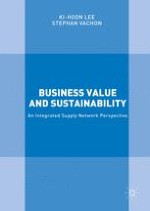2016 | OriginalPaper | Buchkapitel
5. Carbon Management in the Supply Network: Measurement and Reporting
verfasst von : Ki-Hoon Lee, Stephan Vachon
Erschienen in: Business Value and Sustainability
Verlag: Palgrave Macmillan UK
Aktivieren Sie unsere intelligente Suche, um passende Fachinhalte oder Patente zu finden.
Wählen Sie Textabschnitte aus um mit Künstlicher Intelligenz passenden Patente zu finden. powered by
Markieren Sie Textabschnitte, um KI-gestützt weitere passende Inhalte zu finden. powered by
